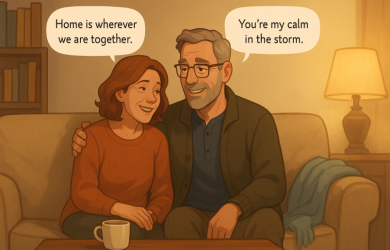7 Masculinity Characteristics Valued by Partners in Relationships

Heal & Grow Daily for a Happier Relationship
Subscribe FREEKey Takeaways
Marriage.com AI Quick Summary
Not everyone expresses love with soft words and grand gestures—some show up with quiet strength, steady presence, and a calm that settles the room. There is something deeply comforting about being with someone who knows who they are and stands by you, not just beside you.
What makes a person feel safe, seen, and respected can look different for everyone… but often, it includes qualities that run deeper than what we first notice. It is not about outdated roles or rigid expectations—it is about how someone carries themselves in a way that invites trust.
These are the things that often get overlooked, but partners remember them. Some of the most grounding forms of love are shaped by what many would call masculinity characteristics—steady, protective, dependable traits that help relationships thrive quietly in the background.
- Disclaimer:
This article explores masculinity characteristics as qualities anyone can embody, regardless of gender. It is not meant to reinforce stereotypes or limit expression but to highlight traits that often bring value to relationships when expressed with care, respect, and emotional awareness.
What are masculinity characteristics in a relationship?
Masculinity characteristics in a relationship are not about being tough or in control all the time. They are the quieter strengths—like being dependable when things feel uncertain or staying calm during a hard conversation.
They show up in how someone takes initiative, sets boundaries, protects what matters, or simply follows through on their word. It is not about fitting a mold; it is about how certain traits—confidence, decisiveness, emotional steadiness—can bring balance and support.
These qualities are not reserved for any one gender… they are human traits that, when used with care and respect, create the kind of love that feels steady, secure, and deeply valued.
Studies highlight that masculinity, shaped by social roles and power, pressures boys and men to reject femininity, suppress emotions, and seek dominance. Reinforced across settings, these norms reward conformity but often lead to health and social issues like anxiety, depression, substance abuse, and violence.
7 masculinity characteristics partners value in a relationship
Some traits speak louder through actions than words. In a relationship, it is often the steady, grounding qualities that make a lasting difference—those quiet but powerful traits that bring safety, trust, and a sense of direction.
These masculinity characteristics are not about control or dominance; they are about presence, consistency, and care… and partners notice.
1. Emotional resilience
Being emotionally resilient does not mean hiding feelings—it means handling them with care. It is about being calm in chaos, listening instead of reacting, and offering a stable place when things get overwhelming.
This kind of strength creates space for vulnerability without judgment. Partners feel safer when they know emotions will not be used against them. It is not about being tough; it is about being steady.
- How it shows up
Taking a deep breath during a tense moment instead of raising your voice, pausing before responding in conflict, or checking in with a calm, “Are you okay?”
Even saying, “I need a moment, but I am not walking away from this,” can build emotional safety. Practice grounding techniques or journaling to stay centered.
2. Decisiveness
There is comfort in knowing someone can make a choice when it matters. Decisiveness brings clarity and direction, especially when life feels messy. It shows confidence, not control—just a willingness to step up when needed.
This quality helps a partner relax a little, knowing they are not carrying everything alone. Even small, thoughtful decisions can make a big emotional impact.
- How it shows up
Choosing a restaurant when your partner is overwhelmed, suggesting a clear plan for the weekend, or being the one to say, “Let’s talk this through tonight.”
Decisiveness is not about dominating decisions—it is about showing you are willing to carry your share. You can also ask, “Would it help if I made a call on this?”
3. Protectiveness
Protectiveness is not about being possessive or overbearing. It is about creating an emotional and physical space where both people feel safe and valued.
Whether it is standing up for a partner or simply checking in after a long day, this trait shows care in quiet ways. It says, “I am here for you,” without needing to be said out loud. That sense of being looked out for can be deeply comforting.
- How it shows up
Walking them to their car, texting, “Did you get home safe?” or stepping in when someone speaks disrespectfully to them.
You can also protect their energy—by offering to handle a stressful task or asking, “Want me to take care of that for you?” It is the little things that build trust over time.
4. Independence
A healthy relationship is made up of two whole people—not one person disappearing into the other. Independence means having your own interests, friendships, and goals… and still choosing to come back to each other.
It builds respect, not distance. When both partners can stand on their own, they create something stronger together. And that space? It keeps the connection from feeling too heavy or overwhelming.
- How it shows up
Spending time with friends, keeping up with hobbies, or having solo goals. It might look like saying, “I love being with you, and I also need a day to recharge.”
Encouraging your partner to do the same creates balance. Independence is also about trusting each other to grow without fear.
5. Leadership
Leadership in a relationship is not about taking charge—it is about guiding with kindness and vision. It looks like initiating hard conversations, planning for the future, or being the one to say, “Let’s fix this.”
It gives a relationship direction without force. This kind of leadership makes a partner feel secure, not controlled. It is about showing up fully, with care and responsibility.
- How it shows up
Planning a budget, offering to go to therapy together, or initiating a conversation about the future.
Saying, “Here is what I am thinking—what do you think?” keeps things collaborative. Leading with kindness also means being the one to apologize first or to name an issue before it becomes a wedge.
6. Confidence
Confidence makes a difference—not arrogance or bravado, but quiet, grounded self-assurance. When someone believes in themselves, it gives the relationship room to breathe.
Research shows high self-esteem benefits romantic relationships by enhancing relationship quality and partner satisfaction. While similarity in self-esteem between partners does not affect satisfaction, factors like perceived regard and secure attachment help explain the positive impact.
It helps settle insecurities and encourages openness. A confident partner is not threatened by growth or change; they welcome it. That stability is something many partners deeply value.
- How it shows up
Owning your flaws and strengths without needing constant validation, being open to feedback, or trying something new without fear of failing.
Saying, “I am proud of how I handled that,” or “I am still figuring this out, but I know I can,” set a tone of self-trust. Your belief in yourself quietly lifts the whole relationship.
7. Respectfulness
Respect is the heartbeat of any strong relationship. It is shown in how someone listens, how they disagree, and how they treat their partner’s time, body, and feelings.
Respectful partners do not need to win—they want to understand. It shows up in everyday moments, not just the big ones.
And when it is there?
Everything else feels safer, softer, more whole.
- How it shows up
Not interrupting, honoring your partner’s boundaries, and speaking kindly even when upset. Saying, “I hear you,” or “Let me think about that,” instead of reacting defensively shows deep care.
Respect is also remembering things that matter to them—birthdays, preferences, or even the way they like to be supported after a long day.
Masculinity vs. femininity characteristics: What’s the difference?
It is easy to assume masculinity and femininity characteristics belong strictly to one gender—but that is not the case. These traits are simply ways of expressing energy, behavior, and emotional patterns that exist in all of us to varying degrees.
In relationships, both sets of qualities can show up, blend, and complement each other beautifully. Understanding their differences does not create division—it helps us appreciate balance.
Aspect Masculinity characteristics Femininity characteristics
Emotional strength Emotional resilience Emotional expression
Decision-making Decisiveness Intuition
Autonomy Independence Nurturing
Direction Leadership Collaboration
Self-view Confidence Receptiveness
Approach to goals Goal-oriented Process-focused
Relational stance Protective Supportive
Thinking style Structured thinking Fluid adaptability
These qualities are not opposites—they are complementary. One is not better than the other, and healthy relationships often thrive when there is space for both.
These characteristics can appear in anyone, regardless of gender, and the healthiest relationships often allow space for both types to emerge and support one another naturally.
Can masculinity characteristics change over time in a relationship?
Sometimes, the way someone shows up in a relationship does not stay exactly the same… and that includes their masculine characteristics. Early on, certain traits might stand out more—like confidence, protectiveness, or independence.
But as the relationship deepens, those same qualities might shift into something softer, more emotionally attuned, or more collaborative. It is not about losing strength—it is about growing into something richer. Life changes people; relationships do, too.
A partner may begin to express their masculinity in quieter, more grounded ways that reflect trust and emotional safety. There is room for these traits to evolve, adapt, and even surprise us… especially when love invites growth rather than performance.
Watch this TED Talk where Garrett Borgman talks about redefining masculinity as he addresses hegemonic masculine behaviors:
Key takeaway
Masculinity characteristics are not a checklist; they are a reflection of how someone shows care, strength, and presence in their own way. They can be bold or quiet, steady or evolving… and that is what makes them meaningful.
What matters most is not fitting a mold but showing up with honesty, effort, and heart. In a healthy relationship, these traits are not about control or dominance—they are about support, emotional steadiness, and shared respect.
And when they are expressed with intention and balance, they often become the quiet foundation that makes a partner feel seen, safe, and deeply valued.
 Tips
Tips
Write your tip or submit a video tip
All tips are reviewed before the publishing.
Share this article on
Recent Articles
Related Quizzes
Heal & Grow Daily for a Happier, Healthier Relationship
Subscribe FREE on YouTube We'd love your feedback!
We'd love your feedback!
 Expert Q&A
Expert Q&A
Ask your question related to this topic & get the support you deserve from experts.


 Reviewed by
Reviewed by
















 Thanks for your feedback!
Thanks for your feedback!